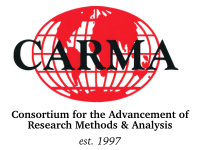
2025-2026 CARMA-AOM Affiliate Program
Strengthen Your Expertise in Research Methods
Academic and Student members can register for free access to a set of Consortium for the Advancement of Research Methods and Analysis (CARMA) resources through their AOM Membership. These resources cover quantitative and qualitative topics at the introductory and advanced levels. CARMA lecturers include Distinguished Career Award Winners from the AOM’s Research Methods Division, journal editors, editorial board members, and recognized experts in their fields who understand how these methods are applied in organizational settings.
This AOM member benefit is available through the 2025-2026 CARMA-AOM Affiliate Program and includes access to 12 live lectures and 50 recordings, including:
• Live access to 12 webcast lectures that cover introductory and advanced topics in research methods and data analysis with emphasis on practical application.
• Limited access to the 12 recordings of these lectures.
• Access to 15 recorded lectures from CARMA’s Introduction to Research Methods Collection.
• Access to 8 recordings from the 2025 Methods Review Watch Series Collection.
• Access to 8 recordings from the 2025 New Student Workshop Series Collection.
• Access to 7 recordings from the 2025 International Presenter Collection.
• 25% discount on Short Course registration fees. These courses provide an equal balance of lectures and lab time and include content not available through other institutions while offering networking opportunities with leading scholars and peers in your area of interest.
Learn more about how to access your CARMA User Account and how to add your free CARMA Membership for AOM affiliates.
Access Your AOM-CARMA Benefits
For 2025-2026, AOM Members will no longer be able to access CARMA program benefits from their AOM Member area. Instead, they must have a CARMA User Account and must sign up for the 2025-2026 CARMA-AOM Affiliate Program. If you are an AOM member, follow the steps below.
New to CARMA – Create a New CARMA User Account
- If you’ve never registered with CARMA through an Institutional or Affiliate Membership:
-
- Create a CARMA User Account (Note: Gmail, Yahoo, Hotmail, and other webmail addresses are not accepted.)
- Check your email for a verification link.
- The message will come from CARMA@ttu.edu via carma=ttu.edu@notifications.med.und.edu.
- Verify your email, then log in to your CARMA User Area to finish setting up your account.
Current Affiliate Members – Create a new CARMA User Account Password
- If you’ve previously registered through the AOM-CARMA direct connection, you are required to establish a new CARMA User Area password
-
- Visit CARMA User Area Forgot Password, and enter the same email address you use for your AOM account.
- Click on E-Mail Reset Password Instructions
- The reset instructions will come from CARMA@ttu.edu via carma=ttu.edu@notifications.med.und.edu
Register for the 2025-2026 CARMA-AOM Affiliate Program:
To access program benefits, you must sign up for the 2025-2026 CARMA-AOM Affiliate Program:
- Once logged in to your CARMA User Area, click the Register/Purchase tab
- Choose 2025-2026 CARMA-AOM Affiliate Program
- Click Continue, then Proceed to Checkout (even though it’s free, checkout is required to complete registration).
For assistance with your AOM-CARMA Affiliate Program account, email carma@ttu.edu.




